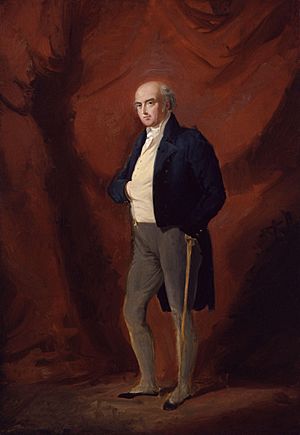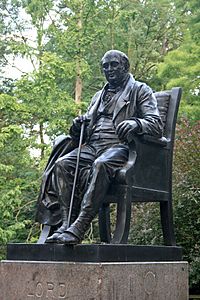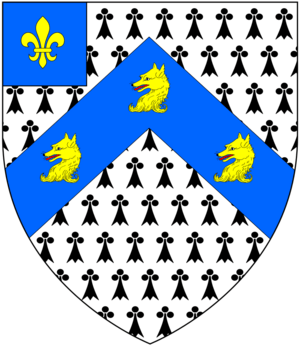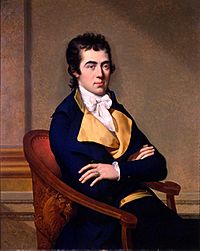Henry Vassall-Fox, 3rd Baron Holland facts for kids
Quick facts for kids
The Lord Holland
|
|
|---|---|

Portrait of Lord Holland by Sir George Hayter, 1820. National Portrait Gallery, London.
|
|
| Lord Privy Seal | |
| In office 8 October 1806 – 31 March 1807 |
|
| Monarch | George III |
| Prime Minister | The Lord Grenville |
| Preceded by | The Viscount Sidmouth |
| Succeeded by | The Earl of Westmorland |
| Chancellor of the Duchy of Lancaster | |
| In office 25 November 1830 – 14 November 1834 |
|
| Monarch | William IV |
| Prime Minister | The Earl Grey The Viscount Melbourne |
| Preceded by | Charles Arbuthnot |
| Succeeded by | Charles Williams-Wynn |
| In office 20 February 1835 – 22 October 1840 |
|
| Monarch | William IV Victoria |
| Prime Minister | The Viscount Melbourne |
| Preceded by | Charles Williams-Wynn |
| Succeeded by | The Earl of Clarendon |
| Personal details | |
| Born | 21 November 1773 Winterslow House, Wiltshire |
| Died | October 22, 1840 (aged 66) |
| Nationality | British |
| Political party | Whig |
| Spouse | Elizabeth Vassall |
| Children | 7, including: Charles Richard Fox Henry Fox, 4th Baron Holland |
| Parents | Stephen Fox, 2nd Baron Holland Lady Mary FitzPatrick |
| Alma mater | Christ Church, Oxford |
Henry Richard Vassall-Fox, also known as the 3rd Baron Holland, was an important English politician. He lived from 1773 to 1840. He was a key member of the Whig political party in the early 1800s. He held several important government jobs. These included Lord Privy Seal and Chancellor of the Duchy of Lancaster.
Contents
Early Life and Education
Henry Holland was born in Winterslow House, Wiltshire. His father was Stephen Fox, the 2nd Baron Holland. His mother was Lady Mary FitzPatrick. He became Baron Holland when he was only one year old. This happened because his father passed away early. His mother also died before his fifth birthday.
He went to school at Eton and then Christ Church, Oxford university. There, he became friends with other future politicians. His uncle was Charles James Fox, a famous Whig speaker. Henry Holland always stayed loyal to the Whig party.
Political Career and Public Service
Lord Holland started his political journey early. In 1791, he visited Paris and met important figures like Lafayette. He joined the House of Lords in 1796. For a while, he was almost the only Whig voice in the upper house of Parliament.
He helped negotiate a treaty with American representatives in 1806. Later that year, he became Lord Privy Seal. This was a high-ranking government position. He served in the government led by Lord Grenville. He left this role in 1807.
Key Political Actions
Lord Holland often spoke out against government actions he disagreed with. For example, he opposed the Regency Bill in 1811. This bill was about who would rule when the king was unwell. He also criticized strong government measures against Napoleon. These measures were called the Berlin Decrees.
He spoke against a treaty with Sweden in 1813. This treaty forced Norway to join Sweden. He also opposed the bill to keep Napoleon imprisoned. This was when Napoleon was held on the island of Saint Helena.
Chancellor of the Duchy of Lancaster
Lord Holland served as Chancellor of the Duchy of Lancaster twice. This was another important government job. His first term was from 1830 to 1834. His second term was from 1835 until he passed away in 1840. He worked in the governments of Lord Grey and Lord Melbourne.
Historical Context of Slave Compensation
After slavery was abolished in the British Empire in 1833, the government paid money to former slave owners. This was not paid to the enslaved people themselves. Lord Holland received payments for enslaved people on his family's estates in Jamaica. These estates came to him through his wife, Elizabeth Webster.
Writings and Legacy

Lord Holland wrote several books. His book Opinions of Lord Holland (1841) collected his speeches. Lord Holland's Foreign Reminiscences (1850) shared interesting stories from his travels. His Memoirs of the Whig Party (1852) is an important record of his time.
He also wrote about Spanish writers like Lope de Vega. He even wrote a unique short story called Eve's Legend. In this story, the only vowel used is the letter 'E'. This style is similar to a modern writing group called the Oulipo school.
Family Life
In 1793, Lord Holland traveled in France and Italy. In Florence, he met Elizabeth Vassall. She was married at the time. After she divorced her husband, she married Lord Holland in 1797. She became Elizabeth Fox, Baroness Holland.
They had several children. Their son, Charles Richard Fox, became a General in the British Army. They also had Henry Edward Fox, who became the 4th Baron Holland. Another child was Mary Elizabeth Fox. In 1800, Lord Holland was allowed to add "Vassall" to his name. He often signed his name as Vassall Holland. He passed away in October 1840, at 66 years old. His son, Henry, took over his title. Lady Holland died in 1845.
Vassall Ward Connection
The Vassall ward in the London Borough of Lambeth is named after Henry Richard Vassall-Fox. He was involved in the first building projects in that area in the 1820s. Roads there, like Holland Grove and Vassall Road, remember his connection to the area.
 | Misty Copeland |
 | Raven Wilkinson |
 | Debra Austin |
 | Aesha Ash |



